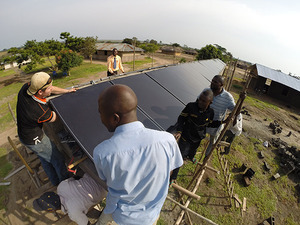The Notre Dame Initiative for Global Development (NDIGD) successfully delivered and, with the help of local staff, installed a solar microgrid for the Université de Notre Dame de Tshumbe (UNITSHU) in January, 2014. Keith and Janet Sherin, Brad Pattelli, and General Electric provided generous sponsorship to complete this ambitious project in a remote area of the Democratic Republic of Congo (DRC).

Tshumbe is a diocese of almost one million people in remote central Congo. While in another country a population of this size would indicate a metropolis, its remoteness and dire lack of infrastructure mean that Tshumbe is actually a very large—and impoverished—set of distant villages. Water, sanitation, and electricity are scarce and only intermittently available. Fuel comes in the form of expensive diesel, which must be flown in by seaplane.
The local Catholic diocese constitutes the largest and most reliable component of Tshumbe’s civil infrastructure. More than half of the village’s population is Catholic, and the Church is the largest landowner and employer in the region. The Diocese of Tshumbe is led by Bishop Nicholas Djomo Lola, who also currently presides over the Conference of Catholic Bishops of the Democratic Republic of the Congo. John Cavadini, associate professor and chair of theology and the McGrath-Cavadini Director of the Institute for Church Life at Notre Dame, has a longstanding relationship with Bishop Djomo.
It was through the relationship between Prof. Cavadini and the Bishop—as well as input from Father Emery Longanga, who recently returned to Tshumbe after completing his master’s degree at Notre Dame—that the University learned of the opportunity to help our sister university obtain reliable power.
The Université de Notre Dame de Tshumbe (UNITSHU) consists of several simple buildings used as lecture rooms and offices for about 800 students. Tshumbe offers an abbreviated, but highly relevant, menu of educational programs: computer science, management and economics, psychology and educational sciences, and medicine.
The lack of a reliable energy source to power computers and even reading lamps for after dark presents a tremendous obstacle to student achievement. It is, moreover, not simply the lack of reliable energy that hinders Tshumbe’s students, but also the incredible cost of that energy when it is available.
The Notre Dame Initiative for Global Development (NDIGD), in an effort initiated by the College of Engineering’s Dean Peter Kilpatrick to help UNITSHU obtain reliable power, and with input and research coordination with Professor Michael Lemmon of the Department of Electrical Engineering, designed and installed a solar hybrid microgrid, complete with battery storage and energy monitoring systems on the grounds of UNITSHU.
Generous donations from Keith (ND ‘81) and Janet Sherin, matching funds provided by General Electric, and Brad Pattelli (ND ’88), underwrite this effort. In addition, Lyman Technologies has provided hardware, design, and integration for the solar microgrid at cost.
Notre Dame and UNITSHU, with the sponsorship and generosity of alumni and corporate partners, have addressed the immediate energy needs of the school. UNITSHU now generates up to 20kWh per day, enough to power their new computer lab, provide study halls after sundown, recharge phones for students and faculty, and begin to bring the remote university into the information age.
This is just a beginning. Data from the solar microgrid is collected and shared with Notre Dame electrical engineering faculty working on improved control systems for remote power generation. Notre Dame and UNITSHU have won an additional grant from The Loyola Foundation to upgrade the computers at UNITSHU. Future projects in development include Notre Dame student internships, faculty research, and service projects at UNITSHU and in the broader Tshumbe community to support the solar research, improve internet connectivity, and build bridges and other infrastructure to make Tshumbe more accessible and more connected.
Contact: Joya Helmuth, NDIGD Outreach Associate, jhelmuth@nd.edu